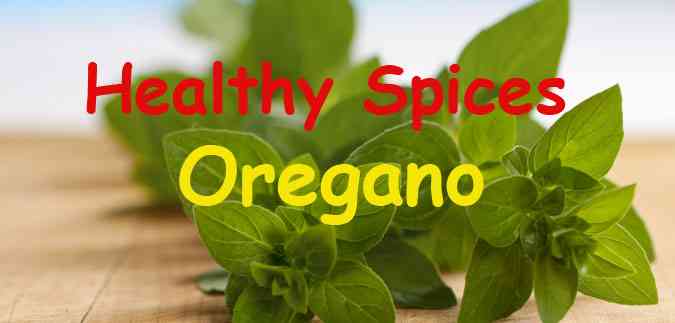Oregano: A Super Spice!
By Krista DeKuyper | March 2, 2016 |

Welcome to this second article in our new “Healthy Spices” blog series. In this edition we take an in-depth look at amazing oregano. We examine its historical uses, as well as its nutritional and medicinal properties.
We also offer some suggestions on the types of food that oregano goes well with, followed by some cautionary notes.
Historical Use of Oregano
Oregano has been in use for thousands of years. In ancient Greece oregano was used for a variety of reasons. The Greeks believed that oregano was a poison antidote, and was also used to treat infections and skin irritations.
Oregano was used extensively by ancient Chinese societies as a key medicinal ingredient. It was also widely used in ancient Egyptian times as both a poison antidote and a preservative.
It is interesting to note that oregano was not only used for culinary and medicinal purposes, it was also believed to have magical qualities according to various folklore!
Oregano was believed to bring good luck, good health, protect people from evil and bring good dreams, just for starters. It was also used in “love potions”, and the Greeks and Romans even crowned newly married couples with a wreath of oregano.1
While we have to wonder about the validity of oregano’s magical qualities, there is no doubt that this ancient spice is very healthy and medicinal for us.
What is Oregano?
Oregano is a perennial herb that belongs to the mint family. It grows up to 80 cm high, and has small leaves that are either green or purplish in colour.
The Latin name for oregano is “origanum vulgare”, which literally translated means “mountain joy”. It is native to Europe and the Mediterranean, but is grown all over the world in temperate climates (it is also easy to grow oregano indoors in pots).
Oregano is grown, harvested and then dried for consumption. It is the loose leaf form that is most often used in cooking.
Of particular interest is oil of oregano. This oil is condensed, thereby magnifying its medicinal and nutritional properties several times over.
Nutritional Properties of Oregano
Oregano is a spice that contains high amounts of vitamin K and manganese. In addition it also a good source of vitamin A, vitamin E, vitamin B6, iron, calcium, magnesium and fiber. (As an aside, when ingesting high amounts of calcium it is very important to also ingest magnesium in order to prevent the calcium from becoming toxic to our bodies, resulting in hardening of the arteries, muscle spasms and fibromyalgia)2.
When used fresh oregano also has significant amounts of vitamin C.
Oregano contains no salt or cholesterol.
For a more complete description of oregano’s nutritional properties please click here.
Medicinal Properties of Oregano
Oregano has an amazing number of medicinal properties, which at least partially explains why it has been so popular with many cultures throughout history.
The following lists just some of oregano’s medicinal properties:
- Oregano contains rosmarinic acid, which is a very powerful anti-oxidant. Anti-oxidants support immune system health and inhibit the occurrence of free radicals. Antioxidants have been linked to:
- Protecting your heart.
- Protecting your DNA.
- Controlling diabetes complications.
- Prevention of dementia.
- Improving the health of our eyesight.3
- Oregano is antifungal and antibacterial due to the carvacol and thymol (essential oils) it contains. In fact, these oregano essential oils may be able to kill the Listeria pathogen as well as the MRSA (Methicillin-resistant Staphylococcus aureus, or “staph”) superbug that made headlines in Canada last year. One of the researchers involved in an MRSA study stated:
“We have done a few preliminary tests and have found that the essential oil from the oregano kills MRSA at a dilution 1 to 1,000. The tests show that the oil kills MRSA both as a liquid and as a vapor and its antimicrobial activity is not diminished by heating in boiling water.”4
- Oregano is an anti-inflammatory due to the E-BCP (beta-caryophyllin) it contains. E-BCP is an aromatic sesquiterpene, and its anti-inflammatory properties help to prevent Crohn’s disease, inflammatory bowel disease as well as a slew of other medical conditions that involve various inflammations.
- Oregano has antiviral properties and can be used in conjunction with other essential oils to treat upper respiratory infections. A study published in the U.S. National Library of Medicine found that oregano oil, when combined with four other aromatic essential oils including eucalyptus, provided immediate and significant relief for upper respiratory ailments5
- Extract of oregano has also been found to arrest the growth of and kill colon cancer cells. A study that was published in the U.S. National Library of Medicine also showed promising results when carnosol (a phytochemical found in oregano) was tested for treating colon cancer, breast cancer, leukemia, and skin cancer.
Oregano oil can be used as an aid for the following medical conditions (we leave it up to the reader to do further research as to why oregano helps out with these conditions, some of which has been mentioned above):
- Common cold
- Influenza (the flu)
- Muscle pain
- Headaches
- Toothaches
- Allergies
- Chronic fatigue
- Bronchitis
- Dandruff
- Menstrual cramps
- Excessive gas
- Acne
- Insect bites (acts as a repellant)
- Intestinal parasites
- Athlete’s foot
- Canker sores
- Gum disease
- Varicose veins
Cooking with Oregano
Oregano is a commonly used spice, and this is especially true for Italian, Spanish and Greek cuisines.
Besides tomato sauces oregano can also be added to salad dressings, vegetable dishes, soups, stews as well as various meat dishes.
In addition adding oregano to a meat dish prior to cooking may help to decrease toxic compounds that are created in the meat that are caused by the cooking process. According to the American Journal of Clinical Nutrition, powerful antioxidant spices added to hamburger prior to cooking results in reduced levels of “malondialdehyde”6, a chemical that is a potential carcinogen (and is still being tested as such).
Note that there are two types of oregano: Mediterranean and Mexican oregano, which come from slightly different plants. Most chefs suggest using the Mexican oregano for spicy dishes (no surprise there folks) and Mediterranean oregano for Italian and Greek types of food.
Cautionary Notes
When cooking with loose leaf spice the amounts of oregano are usually low so the health risks are minimal. If using an oregano extract such as oregano oil then the potential for harmful side effects increases. In addition oregano oil can burn mucous membranes if taken undiluted, ALWAYS dilute oregano oil!
- Oregano MAY BE unsafe when taken in medicinal amounts during a pregnancy (more testing is needed in this area, it is possible it could lead to miscarriage).
- Oregano MAY increase risk of bleeding for people with a bleeding disorder. In addition you should avoid large amounts of oregano a couple of weeks prior to any surgery.
- Some people may be allergic to oregano (likely if you are allergic to spices in the mint family).
- Oregano may lower blood sugar levels, so diabetics need to be cautious when ingesting oregano.
- People taking a medication that contains Lithium should be careful since Lithium interacts with oregano. The oregano may affect the body’s ability to get rid of lithium, resulting in a lithium build-up.7
Conclusion
We hope you enjoyed this blog article about oregano, a truly amazing and tasty spice.
We welcome feedback you might have via the comments section. If you have a suggestion for another Healthy Spices article then please let us know!
Sources:
- 1 http://www.herballegacy.com/Branca_History.htm
- 2 http://www.besthealthmag.ca/best-eats/nutrition/5-reasons-to-eat-more-antioxidants/
- 3 http://articles.mercola.com/sites/articles/archive/2014/02/01/oregano-health-benefits.aspx
- 4 http://www.ncbi.nlm.nih.gov/pubmed/21052500
- 5 http://ajcn.nutrition.org/content/early/2010/04/08/ajcn.2009.28526.full.pdf+html
- 6 http://www.webmd.com/vitamins-supplements/ingredientmono-644-oregano.aspx?activeingredientid=644&






























